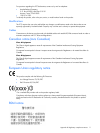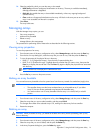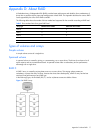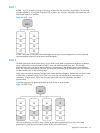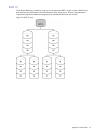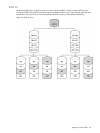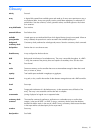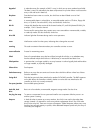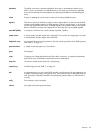Glossary 24
redundant The ability of an array to maintain operability when one or more hardware failures occur.
RAID 1 array is an example of a redundant array. In the event of a drive failure, redundant
arrays can be restored to normal operation by replacing the failed drive and rebuilding the
array.
rescan Process of updating the current screen to show all currently available resources.
segment Disk drive or portion of a disk drive used to create a logical device. A disk can include RAID
segments and available segments. A RAID segment is part of a logical device; it can be used
by only one logical device at a time. Available segments can be used to define a new logical
device. If the disk is not part of any logical device, the entire disk is an available segment.
serial ATA (SATA) A successor to ATA that uses a serial, instead of parallel, interface.
simple volume A volume made up of disk space from a single disk. It can consist of a single region on a disk
or concatenated, multiple regions of the same disk.
single-level array Array created from one or more partitions. See also volume, spanned volume, RAID signature,
and “RAID 1” on page 18.
spanned volume A simple volume that spans two or more drives.
spare See hotspare.
stripe Contiguous set of data distributed across all the disks in an array. A striped array distributes
data evenly across all members in equal-sized sections called stripes.
stripe size The amount of data in each section of a striped array.
striped array See RAID signature and “RAID 5” on page 18.
task An operation that occurs only on the RAID controller, asynchronous to all other operations; for
example, initializing a disk or verifying an array. Some tasks can take an extended period of
time, particularly if the RAID controller is also performing intensive data I/O while the task is
running.
verify See consistency check command.
volume See simple volume and spanned volume.




